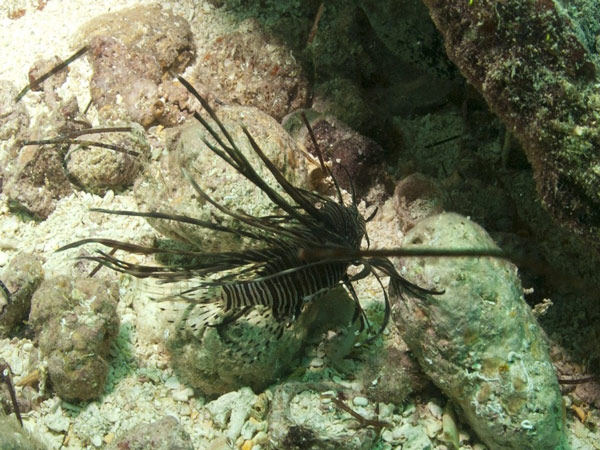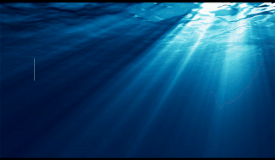 The venomous Pacific Ocean Lionfish has arrived in St. Maarten waters. The Nature Foundation was contacted by a local dive operator reporting a sighting of a two-inch long lionfish on a local dive site The Lionfish is a poisonous fish species which was introduced into the Caribbean and tropical Western Atlantic from the Pacific Ocean in the Early 1990's. The Lionfish has venomous spines all over its body which can cause extremely painful and occasionally fatal stings in its victim. Staff from the Nature Foundation immediately responded to the reported sighting but due to the inclement weather and despite multiple attempts they were not able to capture it. "We were unable to capture the specimen over the last few days because of the squally weather. As soon as the weather clears we will be able to once again attempt to capture the specimen. Lionfish tend to stay in one location for the majority of their lives so we will likely be able to capture it soon," commented Tadzio Bervoets, manager at the Nature Foundation.
The venomous Pacific Ocean Lionfish has arrived in St. Maarten waters. The Nature Foundation was contacted by a local dive operator reporting a sighting of a two-inch long lionfish on a local dive site The Lionfish is a poisonous fish species which was introduced into the Caribbean and tropical Western Atlantic from the Pacific Ocean in the Early 1990's. The Lionfish has venomous spines all over its body which can cause extremely painful and occasionally fatal stings in its victim. Staff from the Nature Foundation immediately responded to the reported sighting but due to the inclement weather and despite multiple attempts they were not able to capture it. "We were unable to capture the specimen over the last few days because of the squally weather. As soon as the weather clears we will be able to once again attempt to capture the specimen. Lionfish tend to stay in one location for the majority of their lives so we will likely be able to capture it soon," commented Tadzio Bervoets, manager at the Nature Foundation.
Lionfish were first introduced after an aquarium tank carrying three of the fish was destroyed in Ft. Lauderdale during hurricane Andrew in 1992. Since then the venomous fish has steadily been invading numerous coastal waters throughout the Bahamas, the United States and the Caribbean. In addition to Lionfish posing a threat to public health they are voracious predators and will eat up to 10% of their body weight. "The problem for fisheries is that our local fish species do not see it as a predator and so they don't know to avoid it. There have been areas in the Bahamas where fishing had to stop because there were no more local fish or lobster being caught in fish and lobsterpots, only poisonous lionfish. That is why it is very important that we have a management structure in place to deal with the invasion," commented Bervoets.
The Nature Foundation has a St. Maarten Lionfish Response Plan in place since before the first specimen was observed in anticipation of the fish reaching local waters. The Foundation stated that it will be doing everything it can to control and manage the infestation but that initial control will be challenging because the Marine Park Ordinance is not yet in place which would have given the Foundation greater resources and legal backing to deal with the invasion.
If a lionfish is observed the Nature Foundation should be contacted immediately at 5444267, 5270490 or 5805703 with information on the location, time of day, and activity. If someone happens to be stung by lionfish medical attention should be sought immediately and hot water be applied to the wound which will help neutralize the venom. The Nature Foundation will be organizing information sessions for the general public concerning the invasion.











